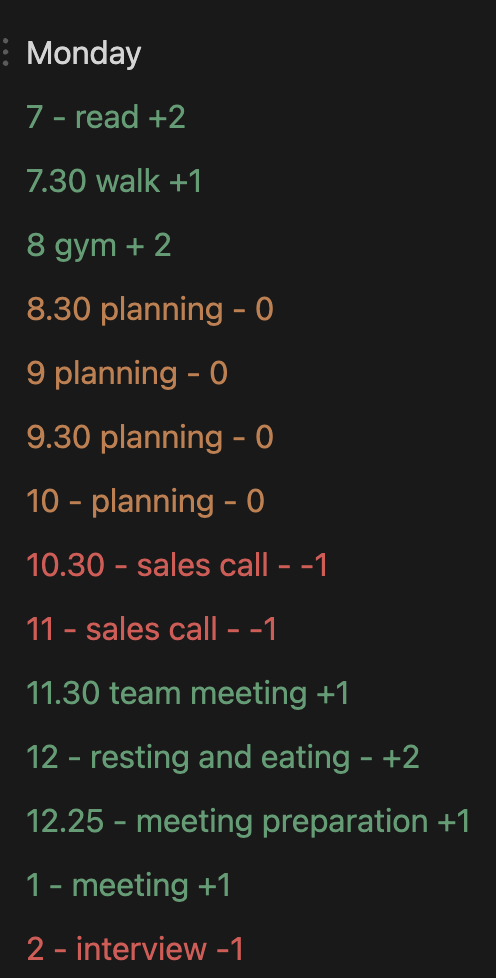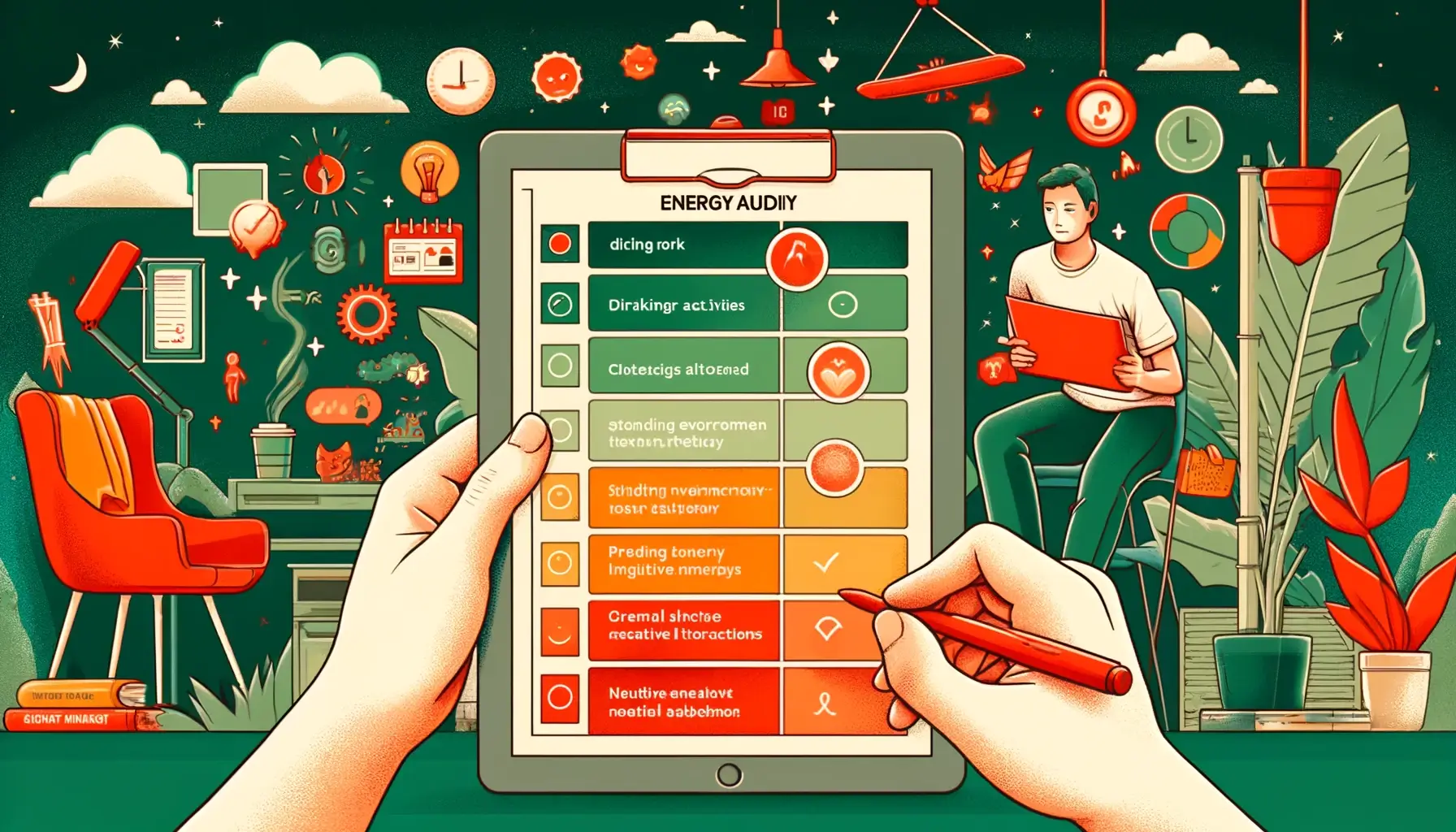Energy management is a crucial aspect of our lives, influencing our productivity, mood, and overall well-being. The concept of a personal energy audit, inspired by insights from the “Mindful Attraction Plan,” involves evaluating how we manage our energy, identifying areas for improvement, and implementing strategies to enhance our energy levels.
What is an Energy Audit?
An energy audit is a systematic approach to examining how energy is used in a particular environment and finding ways to optimize its use. For individuals, it involves assessing physical, mental, and emotional energy to determine what activities drain energy and what activities boost it. By understanding these patterns, you can make informed decisions to improve your energy levels and overall quality of life.
Outgrow problems
One of the crucial lessons of the book is that energy comes in sets.
Sometimes you can’t solve a problem by focusing on that problem.
You outgrow problems by raising your energy.
Focus on opportunities, and turn those problems into opportunities too.
Sometimes too much attention on a problem can make it worse
This is what rumination is.
But going out for a run or a walk and a chat with a friend
Come back with fresh eyes and it’s not such a big problem.
Steps to Conduct a Personal Energy Audit
1. Track Your Energy Levels
Start by tracking your energy levels throughout the day. Use a journal or an app to note down how you feel at different times. Pay attention to activities, interactions, and environments that influence your energy. Use color coding to represent different energy levels:
- Red: Exhausted or drained
- Orange: neutral
- Green: High energy, feeling good
2. Identify Energy Drainers and Boosters
After tracking your energy levels for a week or two, identify patterns. What activities, people, or environments consistently drain your energy? These are your energy drainers. Conversely, what gives you a noticeable energy boost? These are your energy boosters. Common energy drainers include:
- Stressful tasks
- Negative interactions
- Accounting if you hate it
- Cluttered environments
I really recommend this book because it looks at the most common problems – health, relationships, financial and how to solve them.
Energy boosters might include:
- Physical exercise
- Positive relationships
- Relaxing activities
3. Assess Your Primary Relationships
Your relationships have a significant impact on your energy. Positive relationships can create an upward spiral, enhancing your energy and well-being. Conversely, negative relationships can drain your energy and lead to a downward spiral. Evaluate your primary relationships and consider:
- How do you feel after interacting with your partner, family, or close friends?
- Are these relationships supportive and positive?
- Do you need to set boundaries or make changes to improve these interactions?
The “Mindful Attraction Plan” emphasizes the importance of nurturing positive relationships. It suggests that a supportive primary relationship can serve as a significant energy booster, providing emotional stability and encouragement.
4. Develop an Energy Management Plan
Create a plan to manage your energy more effectively. Focus on increasing energy boosters and minimizing energy drainers.
For red, try to work out how to stop doing those, or get them out of your life.
For orange, those are some problems that you need to resolve.
Ideally you will spend all of your time on green.
Strategies might include:
- Prioritizing tasks that energize you
- Scheduling breaks to recharge
- Creating a positive and organized environment
- Engaging in regular physical activity
- Practicing mindfulness or relaxation techniques
5. Implement and Monitor Changes
Put your energy management plan into action and monitor the results. Track your energy levels again to see if there are improvements. Adjust your strategies as needed based on what works best for you.
The Importance of Managing Energy
Managing your energy effectively is essential for maintaining a high quality of life. Improved energy levels lead to:
- Increased productivity
- Better mood and emotional stability
- Enhanced physical health
- Stronger and more positive relationships
Dealing with Different Types of Energy
Understanding the different types of energy and how to manage them is key to overall well-being. Here are some tips for dealing with various types of energy:
Physical Energy
- Exercise regularly: Engage in activities that you enjoy, whether it’s running, yoga, or dancing.
- Eat well: Maintain a balanced diet with plenty of fruits, vegetables, and whole grains.
- Rest adequately: Ensure you get enough sleep and take breaks during the day.
Mental Energy
- Focus on one task at a time: Multitasking can drain mental energy quickly.
- Engage in stimulating activities: Puzzles, reading, and learning new skills can boost mental energy.
- Take mental breaks: Practice mindfulness or meditation to clear your mind.
Emotional Energy
- Surround yourself with positivity: Engage with people who uplift and support you.
- Express your emotions: Talk about your feelings with trusted friends or a therapist.
- Practice gratitude: Regularly reflect on the positive aspects of your life.
Enhancing Energy Through Primary Relationships
Primary relationships, such as those with a partner or close family, play a pivotal role in your energy levels. Positive relationships can:
- Provide emotional support
- Encourage healthy habits
- Create a sense of belonging and security
On the other hand, negative relationships can drain energy and contribute to stress. The “Mindful Attraction Plan” highlights the significance of nurturing and improving your primary relationships by:
- Communicating openly and honestly
- Showing appreciation and gratitude
- Spending quality time together
- Resolving conflicts constructively
Conclusion
Conducting a personal energy audit, as inspired by the “Mindful Attraction Plan,” is a powerful way to understand and manage your energy levels. By identifying what drains and boosts your energy, you can make strategic changes to improve your well-being. Remember, managing your energy is not just about avoiding fatigue; it’s about creating a balanced and fulfilling life. By enhancing your primary relationships and implementing effective energy management strategies, you can achieve a positive cycle of energy and well-being.


